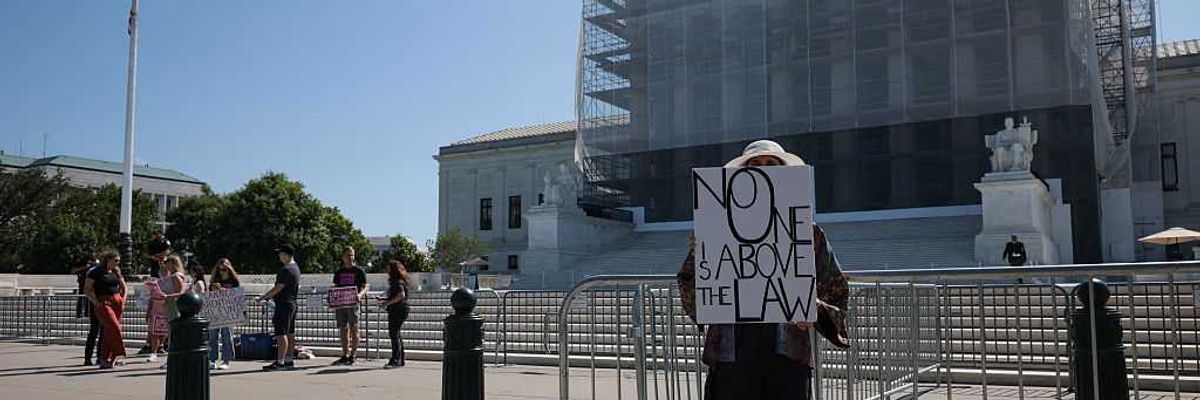With a new term kicking off for the US Supreme Court on Monday, an anti-corruption watchdog group is sounding the alarm about several cases that may "rubber-stamp" President Donald Trump's attempts to further erode the rule of law and consolidate more authority over the federal government.
In a statement published Thursday, Tony Carrk, the executive director of the group Accountable.US warned that during Trump's first nine months in power, the high court's 6-3 conservative majority has "regularly abetted President Trump’s unlawful power grab and indulged his anti-constitutional impulses, which has enriched himself, his family, and his wealthy allies at the expense of everyday Americans while eroding our rights, freedoms, and protections."
He fears the court may do so again as it hands down new, highly consequential rulings. Some cases it plans to decide in the new term will determine whether Trump can use emergency powers to enact tariffs without Congress' approval and fire heads of independent federal agencies, including Federal Reserve Gov. Lisa Cook, without cause.
These cases are all on the latest so-called "shadow docket," by which the court issues emergency rulings without providing a public rationale for its decisions. Since his second term began, Trump has flooded the shadow docket with an unprecedented number of cases.
Georgetown University law professor Steve Vladeck found that in just the first 20 weeks of Trump’s second term, the administration sought emergency action by the court 19 times—the same number of requests made by the Biden administration over four years.
"On issues ranging from dismantling the Department of Education to banning transgender people from serving in the military, federal trial judges from across the ideological spectrum have repeatedly blocked actions by the administration, only for the Supreme Court to halt those rulings with little or no explanation," explained Alicia Bannon, the director of the judiciary program at the Brennan Center for Justice.
Adam Bonica, a political science professor at Stanford University, described the Supreme Court as being "in open conflict with the lower courts over cases involving the Trump administration." Between May 1 and June 23, he found, "federal district courts... ruled against the administration 94.3% of the time. The Supreme Court, however, has flipped that outcome, siding with the administration in 93.7% of its cases (15 out of 16)."
Carrk noted that these new cases "come on the heels of the court’s decision in Trump v. United States last year, which granted Trump broad immunity for unchecked abuses of power at the highest levels of government. This considerable expansion of presidential power arguably emboldened him to take even more extreme, accelerated actions."
Trump is also expected to add other cases to the shadow docket as the term progresses. On Sunday, ABC reported that Trump has requested that the court make an expedited decision on his order ending the constitutional protection of birthright citizenship.
The conservative justices signaled that they may be sympathetic to overturning birthright citizenship when they ruled in June that lower courts could not issue nationwide injunctions to stop its enforcement. Since then, three more federal judges have ruled the order unconstitutional.
The new term will come as the American public increasingly doubts the Supreme Court's evenhandedness. A Gallup poll published Wednesday found that 43% of Americans believe that the court is "too conservative." While this was the highest proportion ever recorded, it has held roughly steady since 2022, when the court overturned Roe v. Wade, which has allowed many states to severely restrict or outright ban abortion.
Approval of the court has plummeted more generally over the past five years. In 2020, just two months before the death of the liberal justice Ruth Bader Ginsburg, 58% of Americans approved of the job the Supreme Court was doing. Now just 42% say they approve of the court, just slightly up from the 39% nadir recorded in July, which was the lowest level of support the court had received in Gallup's 25-year trend.
"As the court’s new term kicks off, Carrk concluded, all eyes will be on its conservative majority to show that they’re capable of standing up for our rights, freedoms, and the Constitution, or they will further risk undermining their legitimacy and waning trust among the American public."




